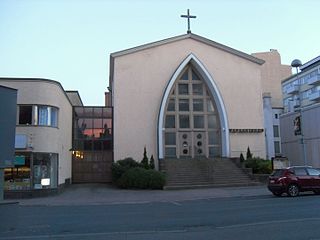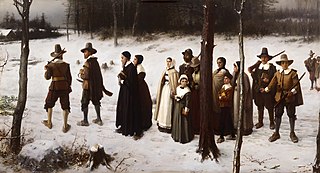The Union of Methodist and Waldensian Churches (Italian : Unione delle Chiese Metodiste e Valdesi) is an Italian united Protestant denomination.
It was founded in 1975 upon the union of the Waldensian Evangelical Church (a Calvinist church with pre-Reformation roots) and the Methodist Evangelical Church in Italy.
It has 50,000 members (45,000 Waldensians, of whom 30,000 in Italy and some 15,000 divided between Argentina and Uruguay, and 5,000 Methodists) and it is member of both the World Communion of Reformed Churches (as Waldensian Evangelical Church) and of the World Methodist Council (as Methodist Evangelical Church).
It is a founding member of the Federation of Evangelical Churches in Italy, an ecumenical body representing Italian historical Protestant denominations. The denomination voted, in 2010, to bless same-gender couples. [1] [2]

Continental Reformed Protestantism is a part of the Reformed tradition within Protestantism that traces its origin to continental Europe. Prominent subgroups are the Dutch Reformed, the German Reformed the Swiss Reformed, the French Huguenots, the Hungarian Reformed, and the Waldensian Church in Italy.

The Waldensians, also known as Waldenses, Vallenses, Valdesi, or Vaudois, are adherents of a church tradition that began as an ascetic movement within Western Christianity before the Reformation. Originally known as the Poor of Lyon in the late twelfth century, the movement spread to the Cottian Alps in what is today France and Italy. The founding of the Waldensians is attributed to Peter Waldo, a wealthy merchant who gave away his property around 1173, preaching apostolic poverty as the way to perfection.
A Christian denomination is a distinct religious body within Christianity that comprises all church congregations of the same kind, identifiable by traits such as a name, particular history, organization, leadership, theological doctrine, worship style and, sometimes, a founder. It is a secular and neutral term, generally used to denote any established Christian church. Unlike a cult or sect, a denomination is usually seen as part of the Christian religious mainstream. Most Christian denominations refer to themselves as churches, whereas some newer ones tend to interchangeably use the terms churches, assemblies, fellowships, etc. Divisions between one group and another are defined by authority and doctrine; issues such as the nature of Jesus, the authority of apostolic succession, biblical hermeneutics, theology, ecclesiology, eschatology, and papal primacy may separate one denomination from another. Groups of denominations—often sharing broadly similar beliefs, practices, and historical ties—are sometimes known as "branches of Christianity". These branches differ in many ways, especially through differences in practices and belief.

The mainline Protestant churches are a group of Protestant denominations in the United States and Canada largely of the theologically liberal or theologically progressive persuasion that contrast in history and practice with the largely theologically conservative evangelical, fundamentalist, charismatic, confessional, Confessing Movement, historically Black church, and Global South Protestant denominations and congregations. Some make a distinction between "mainline" and "oldline", with the former referring only to denominational ties and the latter referring to church lineage, prestige and influence. However, this distinction has largely been lost to history and the terms are now nearly synonymous.

A united church, also called a uniting church, is a denomination formed from the merger or other form of church union of two or more different Protestant Christian denominations, a number of which come from separate and distinct denominational orientations or traditions. Multi-denominationalism, or a multi-denominational church or organization, is a congregation or organization that is affiliated with two or more Christian denominations, whether they be part of the same tradition or from separate and distinct traditions.

A free church is any Christian denomination that is intrinsically separate from government. A free church neither defines government policy, nor accept church theology or policy definitions from the government. A free church also does not seek or receive government endorsements or funding to carry out its work. The term is only relevant in countries with established state churches. Notwithstanding that the description "free" has no inherent doctrinal or polity overtones. An individual belonging to a free church is known as a free churchperson or, historically, free churchman. In Scandinavia, free churchpersons would include Protestant Christians who are not communicants of the majority national church, such as the Lutheran Church of Sweden. In England, where the Church of England was the established church, other Protestant denominations such as Presbyterians, Congregationalists, Baptists, the Plymouth Brethren, Methodists and Quakers are, accordingly, free churches. In Scotland it might be used regarding any Protestant denomination, including the Free Church of Scotland, the Free Presbyterian Church of Scotland, the Reformed Presbyterian Church of Scotland etc, in distinction to the established Church of Scotland.

Protestant denominations arrived in the Philippines in 1898, after the United States took control of the Philippines from Spain, first with United States Army chaplains and then within months civilian missionaries.

Religion in Italy has been historically characterised by the dominance of the Catholic Church, the largest branch of Christianity, since the East–West Schism. This is in part due to the importance of Rome in the history of the Church, including its historical status as a leading patriarchate and the presence of the Vatican, the Catholic Church's headquarters and the residence of the Pope—the Bishop of Rome—within its borders. However, due to immigration, notably the influx of Muslims, Eastern Orthodox Christians, Protestants, Buddhists and Hindus, as well as proselytism and secularization, religious pluralism in Italy has increased in the 21st century. Italy also features a pre-Christian Jewish community, an autochthonous Protestant church–the Waldensian Evangelical Church and one of the largest shares of Jehovah's Witnesses in the world.

Christianity in Italy has been historically characterised by the dominance of the Catholic Church since the East–West Schism. However, the country is also home to significant Christian minorities, especially Orthodox Christians, Protestants and Jehovah's Witnesses.

The Waldensian Evangelical Church is a Protestant denomination active in Italy and Switzerland that was independent until it united with the Methodist Evangelical Church in Italy in the Union of Methodist and Waldensian Churches. Founded in the 12th century by Peter Waldo as a proto-Protestant group, since the 16th century Reformation it has adopted Calvinist theology and blended into the wider Calvinist tradition. It is one of several Protestant denominations with pre-Reformation roots, and is appraised by various denominations of Protestantism as its major successor.
The Methodist Evangelical Church in Italy, known also as Italian Methodist Church, is a Protestant church in the Methodist tradition active in Italy that is in full communion with the historical Waldensian Evangelical Church in the Union of Methodist and Waldensian Churches. It part of the World Methodist Council.
The Federation of Evangelical Churches in Italy is an ecumenical Protestant body in Italy.

Christianity is the prevalent religion in the United States. A Gallup survey from 2023 indicates that of the entire U.S. population about 67% is Christian. The majority of Christian Americans are Protestant Christians, though there are also significant numbers of American Roman Catholics and other Christian denominations such as Latter Day Saints, Eastern Orthodox Christians, Oriental Orthodox Christians, and Jehovah's Witnesses. The United States has the largest Christian population in the world and, more specifically, the largest Protestant population in the world, with nearly 210 million Christians and, as of 2021, over 140 million people affiliated with Protestant churches, although other countries have higher percentages of Christians among their populations. The Public Religion Research Institute's "2020 Census of American Religion", carried out between 2014 and 2020, showed that 70% of Americans identified as Christian during this seven-year interval. In a 2020 survey by the Pew Research Center, 65% of adults in the United States identified themselves as Christians. They were 75% in 2015, 70.6% in 2014, 78% in 2012, 81.6% in 2001, and 85% in 1990. About 62% of those polled claim to be members of a church congregation.

The Communion of Protestant Churches in Europe is a fellowship of over 100 Protestant churches which have signed the Leuenberg Agreement. Together they strive for realizing church communion, especially by cooperation in witness and service to the world. Prior to 2003 the CPCE was known as the "Leuenberg Church Fellowship".

Protestantism is a branch of Christianity that emphasizes justification of sinners through faith alone, the teaching that salvation comes by unmerited divine grace, the priesthood of all believers, and the Bible as the sole infallible source of authority for Christian faith and practice. The five solae summarize the basic theological beliefs of mainstream Protestantism.

Protestantism in Italy comprises a minority of the country's religious population.

Protestantism is the largest grouping of Christians in the United States, with its combined denominations collectively comprising about 43% of the country's population in 2019. Other estimates suggest that 48.5% of the U.S. population is Protestant. Simultaneously, this corresponds to around 20% of the world's total Protestant population. The U.S. contains the largest Protestant population of any country in the world. Baptists comprise about one-third of American Protestants. The Southern Baptist Convention is the largest single Protestant denomination in the U.S., comprising one-tenth of American Protestants. Twelve of the original Thirteen Colonies were Protestant, with only Maryland having a sizable Catholic population due to Lord Baltimore's religious tolerance.

The Evangelical Church of the River Plate is a United, Protestant denomination with congregations in Argentina, Paraguay, and Uruguay. It is named after the Río de la Plata Basin, where the majority of its congregations are located. The IERP was affiliated with the Evangelical Church in Germany from 1934–1965, when it became independent. The church ordains women as ministers and supported civil unions and same-sex marriage. It has approximately 27,500 members. The denomination is a member of the World Council of Churches and the Lutheran World Federation.